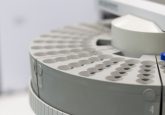Blood test could detect solid cancers
Researchers have developed a technique with the potential to diagnose different types of solid cancers using blood samples.
Recent research published in Nature Medicine has discovered that in the near future a single blood sample could be all that is required to diagnose many types of solid cancers. This one sample may also be able to monitor the amount of cancer in a patient’s body and their responses to treatment. Scientists at Stanford University Medical Center (CA, USA) have developed a technique termed CAPP-Seq (cancer personalized profiling by deep sequencing), which is believed to be applicable to many types of cancer. Using CAPP-Seq in their study, the researchers were able to detect circulating tumor DNA (ctDNA) in 50% of patients with stage I non-small-cell lung cancer (NSCLC) and 100% of patients whose NSCLC was advanced.
ctDNA is considered a promising biomarker for assessment of cancer burden, however, existing methods are not sufficient for wide clinical application. Most ctDNA is not related to cancer, therefore a method that accurately extracted and distinguished ctDNA containing mutations was needed. Thus the authors, led by Maximilian Diehn, assistant professor of radiation oncology, and Ash Alizadeh, assistant professor of medicine, developed CAPP-Seq. When examining blood, this newly developed technique is sensitive enough to detect one molecule of ctDNA in 10,000 healthy DNA molecules.
The group looked at databases, such as the Cancer Genome Atlas, in order to identify the regions of the genome that are most commonly altered in cancer. They then used computational techniques to identify the genetic architecture of the disease, which led to the identification of the areas of the genome that could best identify and track the cancer. One-hundred and thirty nine genes were detected that were commonly mutated in NSCLC. Oligonucleotides were then prepared based on these regions and used for deep sequencing. By focusing the sequencing on these identified regions, the overall cost of sequencing was reduced.
This oligonucleotide-based sequencing of tumor samples from patients with cancer identified mutations in individual patients’ tumors. Using the oligonucleotides allowed the researchers to quickly pinpoint patient-specific mutations that could be used to monitor disease. When the researchers applied the technique to patients with NSCLC, they detected cancer in 100% of patients with stage II or higher disease, and in 50% of patients with stage I disease. ctDNA levels were highly correlated with tumor volume and measurement of ctDNA levels led to earlier response assessment than radiographic approaches. Biopsy-free tumor screening and genotyping was also examined using CAPP-Seq.
The group are now looking forward to investigating whether CAPP-Seq can improve patient outcomes and decrease costs, and are also intending to extend the technique to other tumor types. The authors only examined NSCLC in their research, but the technique could be widely applicable to other solid cancer types. It is also possible that in the future CAPP-Seq could be used not only to track the progress of an already diagnosed patient, but also to screen healthy or at-risk populations to determine their risk of developing cancer in later life. The authors of the study hope that CAPP-Seq could be used to personalize cancer therapy in the future by its routine application in the detection and monitoring of diverse malignancies in the clinic.
Source: Newman AM, Bratman SV, To J et al. An ultrasensitive method for quantitative circulating tumor DNA with broad patient coverage. Nat. Med. DOI:10.1038/nm.3519 (2014) (Epub ahead of print); Blood test could provide rapid, accurate method of detecting solid cancers, study finds.





